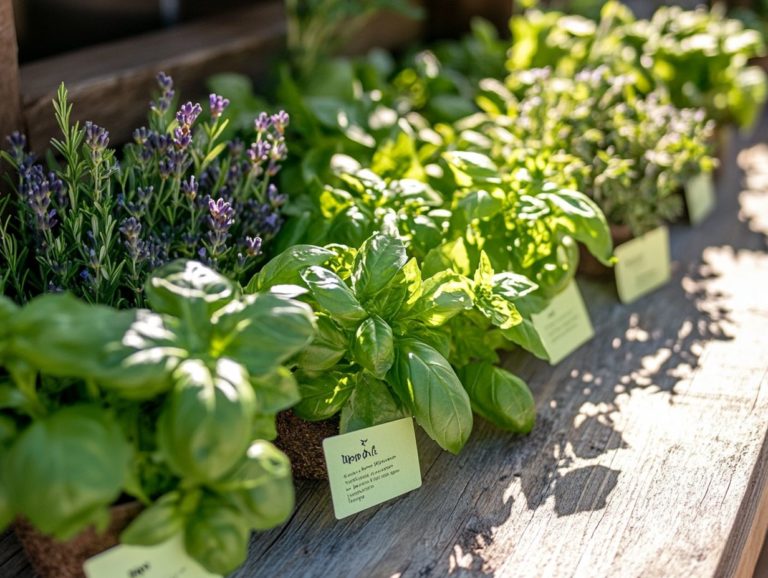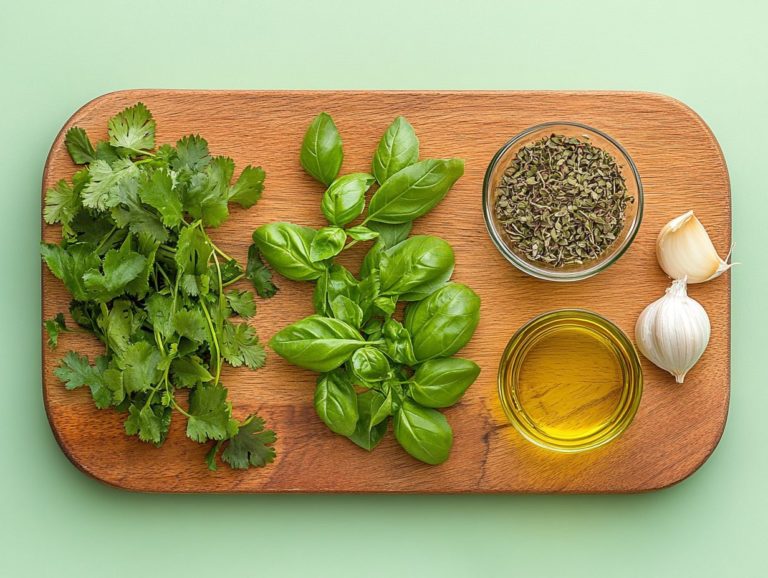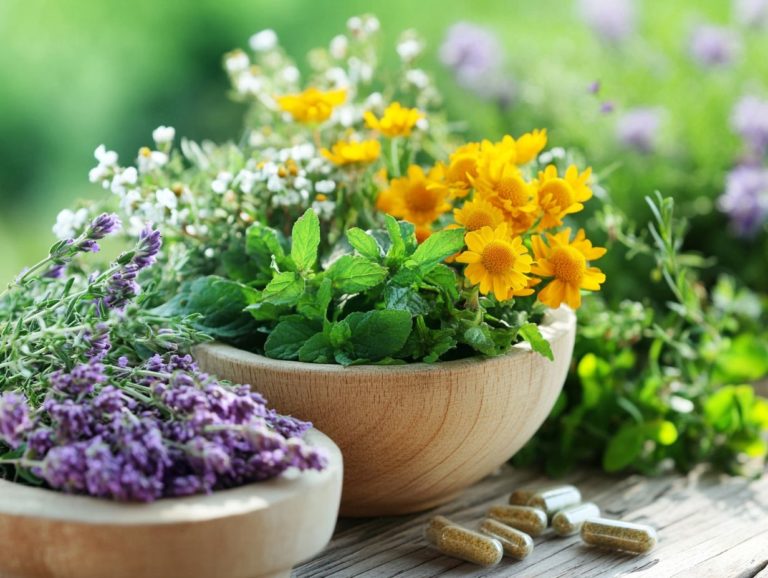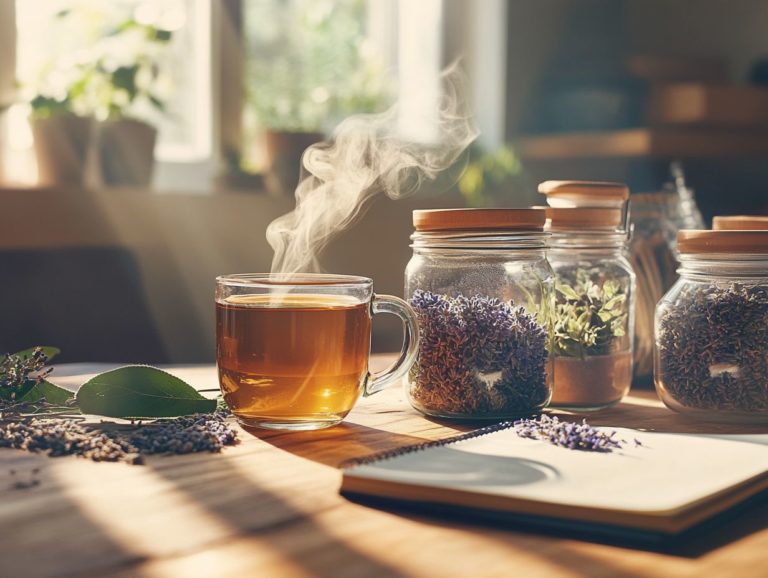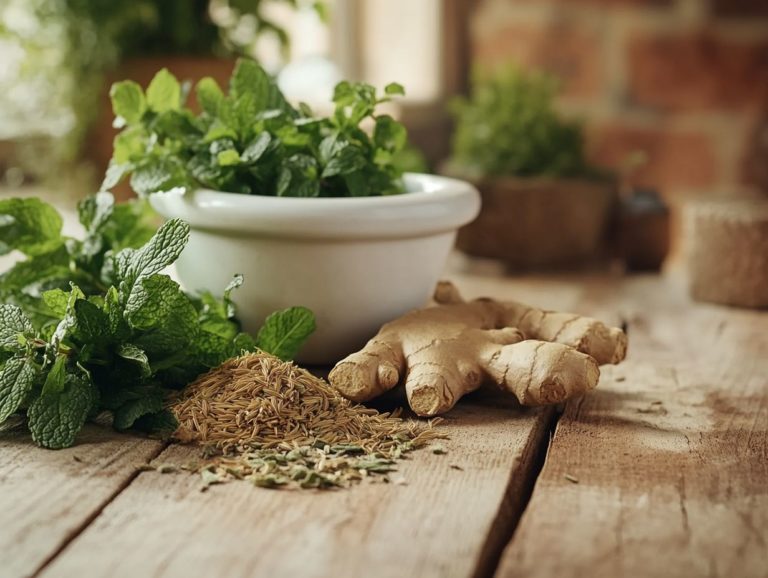Herbs to Help with Sleep Disorders
Struggling to get a good night’s sleep? You re certainly not alone. Many individuals seek solace in traditional herbs as natural remedies for sleep disorders.
This article explores many herbs known for their calming effects and highlights modern research that supports their effectiveness. From identifying the best herbs for restful sleep to offering practical tips on usage and necessary precautions, this guide empowers you to harness nature s solutions for healthier sleep.
Say goodbye to sleepless nights! It’s time to embrace peaceful, restorative sleep!
Contents
- Key Takeaways:
- Common Types and Causes
- Traditional Herbs for Sleep
- Modern Research on Herbal Sleep Aids
- Top Herbs to Treat Sleep Disorders Effectively
- How to Use Herbs for Better Sleep
- Precautions and Side Effects
- Frequently Asked Questions
- What are the best herbs to help with sleep disorders and address sleep-related struggles?
- How do these herbs help with sleep disorders and promote sleep?
- Are these herbs safe to use for sleep disorders and chronic insomnia?
- Is it better to take these herbs in tea or dietary supplements?
- Are there any potential side effects of using these herbs as sleep aids?
- Can these herbs be used in conjunction with other sleep medications or over-the-counter remedies?
Key Takeaways:
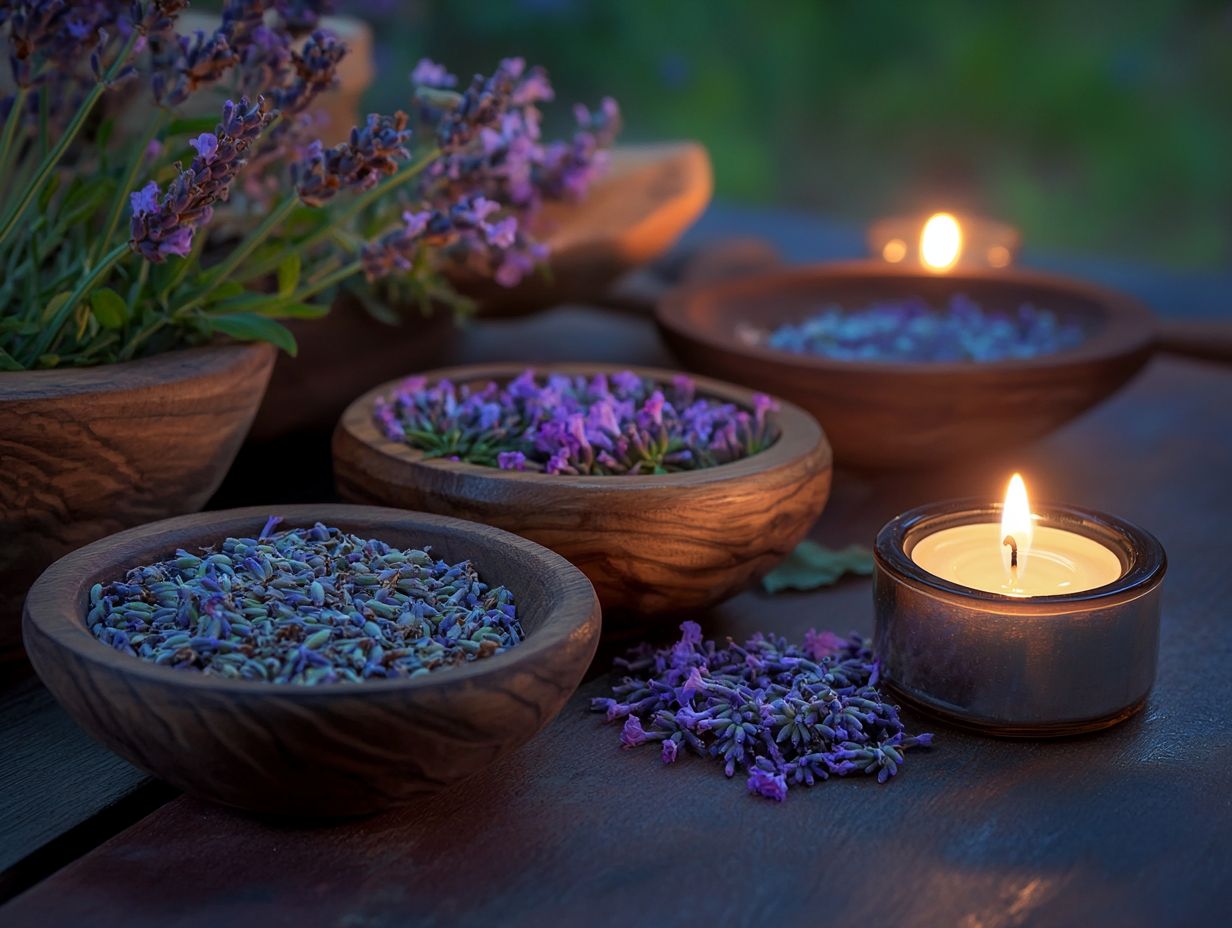
- Incorporating traditional herbs into your routine can help improve sleep by promoting relaxation and reducing anxiety. These natural remedies can also serve as dietary supplements for further enhancement.
- Modern research has shown that herbs like valerian, lavender, and chamomile provide evidence-based benefits for treating sleep disorders.
- When using herbs for sleep, it’s important to follow recommended methods and dosages and be aware of any potential precautions or risks, especially for individuals taking other medications.
Common Types and Causes
Understanding the common types and causes of sleep-related struggles is crucial for effectively addressing sleep disorders. You may encounter different forms of insomnia, often caused by a mix of factors such as stress, lifestyle choices, and underlying health conditions.
Chronic insomnia significantly affects a large segment of the aging population, making it a pressing health concern that requires appropriate interventions. This situation leads many to explore alternative therapy options.
Traditional Herbs for Sleep
Traditional herbs for sleep have long been your allies, providing natural remedies that help you achieve restorative slumber. Valerian root and chamomile are notable for their soothing effects and proven ability to enhance sleep quality. Ashwagandha is increasingly recognized for its anxiety-relieving properties.
These herbal treatments, rooted in ancient wisdom, remain relevant in today s landscape of herbal medicine.
History and Traditional Uses
The history and traditional uses of herbs for sleep reveal a fascinating tapestry of cultural practices that have evolved over centuries. Valerian root, derived from the valerian plant, has been celebrated since ancient times for its sleep-enhancing properties. Chamomile has also long held its place as a staple in herbal medicine, known for its soothing effects. These remedies are integral components of relaxation techniques.
Throughout history, various cultures have revered these plants, often incorporating them into their daily rituals and spiritual practices. For example, in Ancient Greece, valerian was valued for its calming effects, resulting in better sleep quality, while chamomile became a favorite in Europe for its gentle sedative effects.
Your interest in herbal medicine reflects a broader resurgence, as many seek to return to these natural remedies for holistic well-being. By combining traditional herbs with modern relaxation techniques such as meditation and aromatherapy, you can create a comprehensive toolkit that includes herbs for relieving stress-induced tension to tackle sleep disturbances in our fast-paced world.
Modern Research on Herbal Sleep Aids
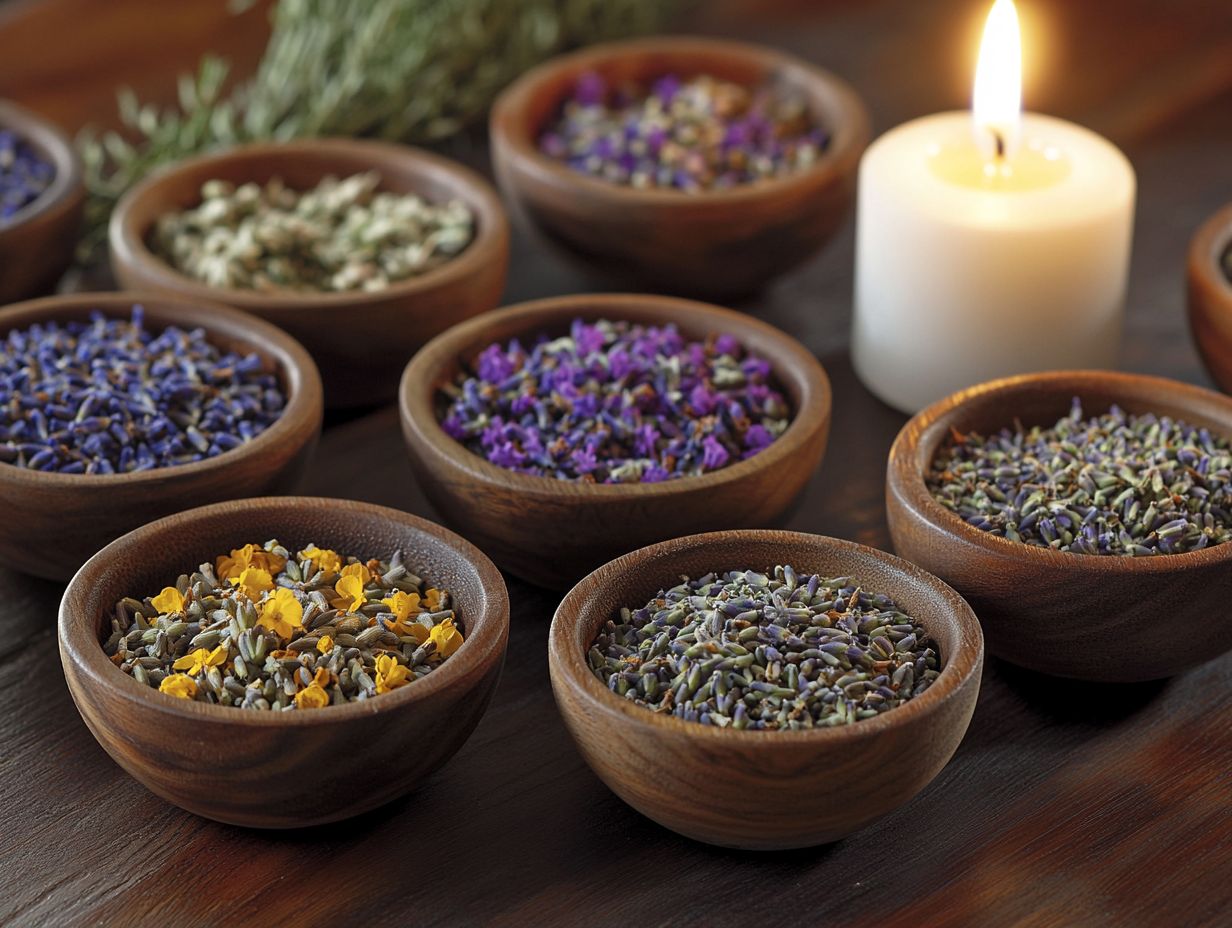
Modern research on herbal sleep aids reveals compelling, evidence-based benefits that affirm the use of various natural remedies for improving sleep patterns. Scientific studies demonstrate that herbs like valerian root and chamomile can positively impact melatonin production, ultimately enhancing sleep quality and minimizing disturbances.
This trend toward herbal supplements indicates a growing interest in alternative therapies for addressing sleep-related challenges.
Ready to explore the potential of herbal remedies for better sleep? Consult a healthcare professional for personalized advice and discover how you can improve your sleep naturally!
Evidence-based Benefits
The evidence-based benefits of herbal remedies like valerian root and chamomile tea are gaining significant recognition in recent studies. These herbs serve as effective sleep aids, enhancing sleep hygiene by promoting relaxation and alleviating anxiety.
Research indicates that integrating these natural sleep solutions can markedly improve overall sleep quality. Recent findings reveal that valerian root, a staple in traditional medicine, can help shorten the time it takes to fall asleep. Additionally, herbs that help with mood improvement, like chamomile tea, known for its calming properties, eases nighttime restlessness.
Studies show that individuals who incorporated these herbal products into their routines experienced fewer disruptions at night and awoke feeling more refreshed. By deepening the understanding of these 5 herbs to improve your sleep quality, researchers are laying the groundwork for their incorporation into modern sleep interventions, offering a holistic approach to cultivating better sleep patterns.
Top Herbs to Treat Sleep Disorders Effectively
Identifying the best herbs for sleep disorders is essential for effective insomnia treatment and getting a good night’s sleep. Consider valerian root, renowned for its calming effects, and chamomile, often enjoyed as a soothing tea.
Herbs like lavender and lemon balm also provide anxiety relief, making them excellent choices for anyone grappling with sleep challenges. For those dealing with mood fluctuations, exploring herbal solutions for seasonal affective disorder can be beneficial. Incorporating these herbal remedies into your routine enhances your chances of enjoying a peaceful night’s sleep.
Descriptions and Uses
The descriptions and uses of herbs like valerian root, chamomile, and lavender illustrate their effectiveness in promoting better sleep. These herbs are not just natural remedies; they come in various forms to align with individual preferences and lifestyle.
For example, valerian root can be taken as capsules or tinctures concentrated herbal extracts for those who appreciate a strong dose, offering calming effects that facilitate a smoother transition into sleep.
Chamomile, widely celebrated for its soothing properties, is often enjoyed as a fragrant tea, perfect for sipping before bedtime. This ritual enhances relaxation and alleviates anxiety.
Lavender, renowned for its calming aroma, can be utilized in essential oil diffusers or even as a pillow spray, creating a tranquil environment that nurtures restful sleep. Passion flower, available in both extract and tea form, proves particularly beneficial for easing racing thoughts and promoting serene slumber, effectively addressing both anxiety and insomnia.
How to Use Herbs for Better Sleep
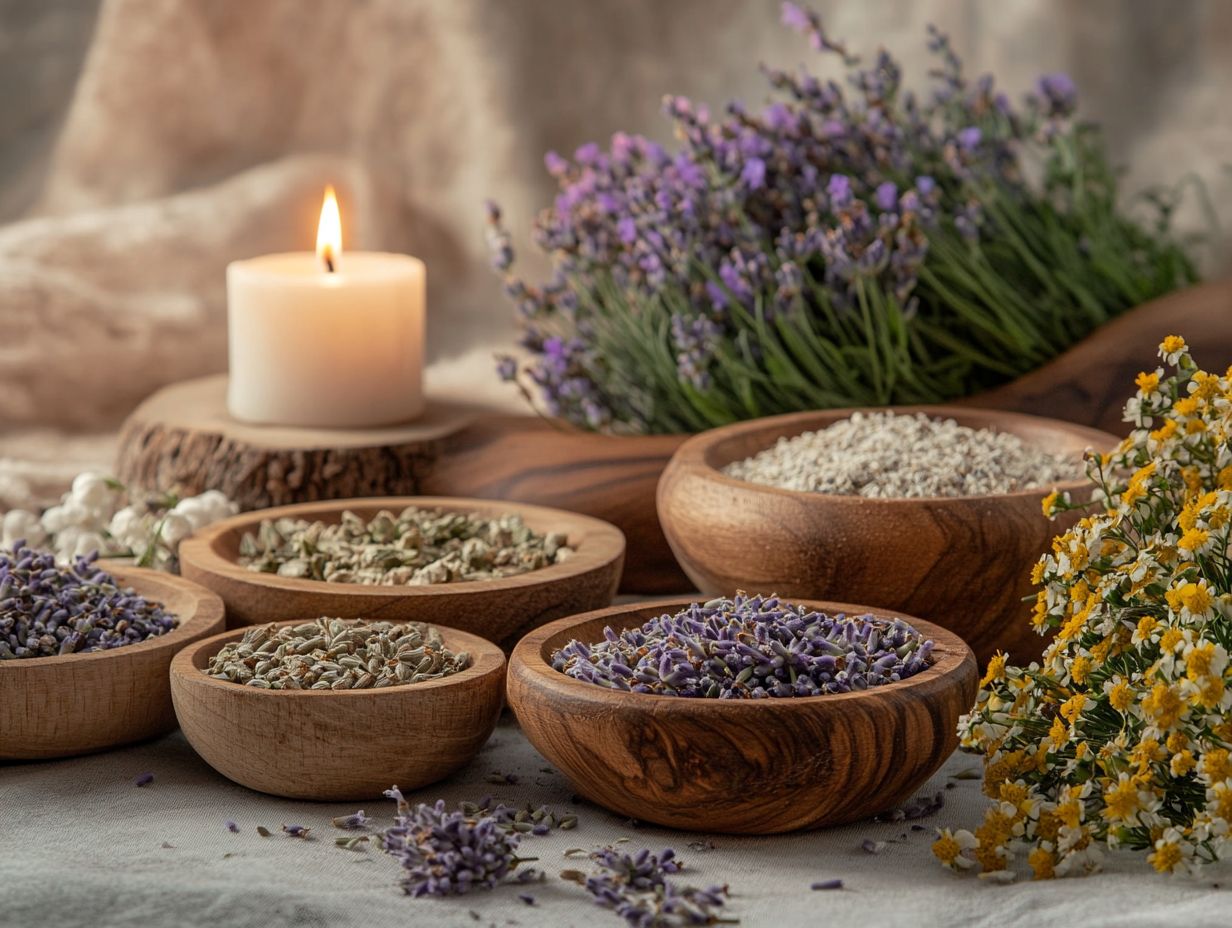
Mastering the art of using herbs for improved sleep requires a nuanced understanding of the right methods and dosages for various herbal supplements. Each form be it teas, tinctures, or capsules demands particular preparation techniques to truly harness their natural sleep-enhancing properties.
For instance, savoring chamomile tea just before bed creates a soothing ritual, while valerian root offers the convenience of capsules, making it easy to incorporate into your nighttime routine. If you’re curious about additional options, you might wonder can herbal remedies help with insomnia?
Methods and Dosages
Exploring the methods and dosages of herbal remedies for sleep is key to optimizing your sleep quality. For example, discover how valerian root can transform your sleep when taken in capsule form, while chamomile is most beneficial when brewed into a soothing tea. Understanding the correct dosages tailored to your individual needs is critical for effective sleep hygiene.
Other herbs, such as passionflower and lemon balm, can also significantly contribute to promoting restful slumber. Passionflower is often enjoyed as a tea or tincture, ideally consumed about an hour before bedtime. For those looking for calming beverages, 5 herbal teas for a good night’s sleep can be effective options. Lemon balm can be effective in both capsule and tea forms, with recommended dosages typically ranging from 300 to 600 mg, depending on personal requirements.
Timing is paramount; integrating these herbs into your evening routine greatly enhances sleep quality. Establishing a calming pre-sleep ritual with these remedies reinforces your overall sleep hygiene, leading to more restorative nights.
Start your journey to better sleep tonight with these herbal solutions!
Precautions and Side Effects
When contemplating herbal supplements for sleep, it s essential to recognize potential precautions and side effects. While many herbs, like valerian root and chamomile, are typically safe for use, they can interact with certain medications. They may also produce undesirable side effects if consumed in excess.
Understanding these risks is vital for ensuring safe and effective sleep management and promoting immune support.
Possible Risks and Interactions
Possible risks and interactions associated with herbal remedies can greatly influence both their effectiveness and safety. For example, valerian root may interact with certain sleep medications, potentially amplifying their sedative effects.
It s important to be aware of FDA regulations surrounding herbal supplements to ensure responsible usage. When considering adding herbal therapies to your routine, recognize that some herbs might make side effects worse from conventional treatments.
Take St. John s Wort, for instance; it s known to reduce the effectiveness of various prescription drugs by affecting substances in the liver that help break down drugs. Be aware that the FDA does not scrutinize herbal supplements with the same rigor as pharmaceuticals, introducing significant safety concerns.
By understanding these details, you empower yourself to make informed decisions, prioritizing your health while ensuring a balanced approach to using herbal remedies alongside any existing medications.
Frequently Asked Questions
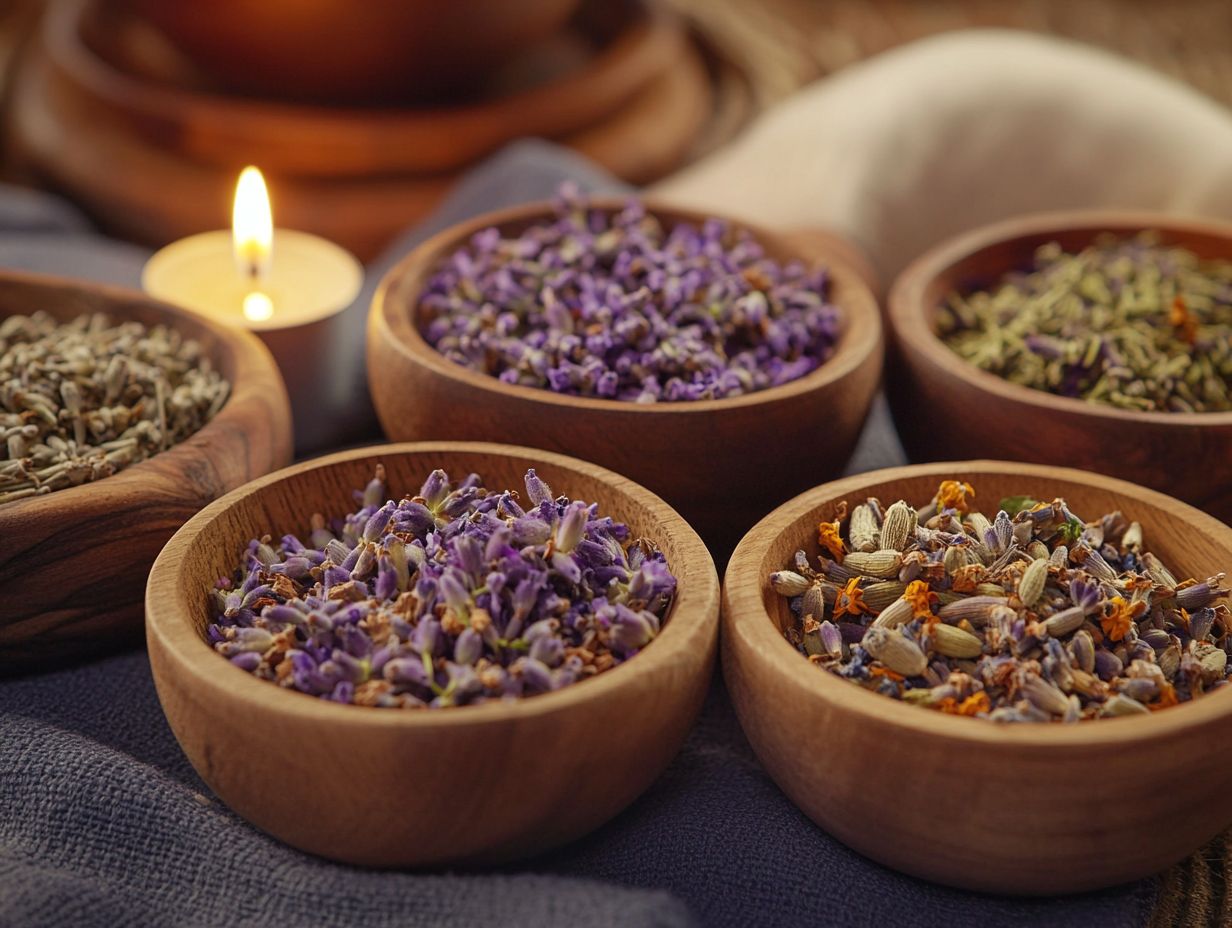
Some of the most commonly recommended herbs for sleep disorders include valerian root, chamomile, passionflower, lavender, and lemon balm.
How do these herbs help with sleep disorders and promote sleep?
These herbs contain natural compounds that have sedative and calming effects. They can help induce sleep and improve overall sleep quality.
Are these herbs safe to use for sleep disorders and chronic insomnia?
In general, these herbs are considered safe for short-term use. However, it is always recommended to consult with a healthcare professional before starting any new herbal treatment, especially if dealing with sleep disturbances or insomnia.
Is it better to take these herbs in tea or dietary supplements?
It ultimately depends on personal preference. Some people find that drinking herbal tea before bedtime helps promote relaxation, while others prefer taking herbal supplements for a more concentrated effect that can improve sleep patterns.
Are there any potential side effects of using these herbs as sleep aids?
While these herbs are generally safe as sleep aids, some people may experience side effects such as drowsiness, headaches, or upset stomach. If you experience any negative effects, discontinue use and consult with a healthcare professional.
Can these herbs be used in conjunction with other sleep medications or over-the-counter remedies?
It is important to consult with a healthcare professional before combining herbs with prescription or over-the-counter remedies. Some herbs may interact with medications and cause adverse effects.

